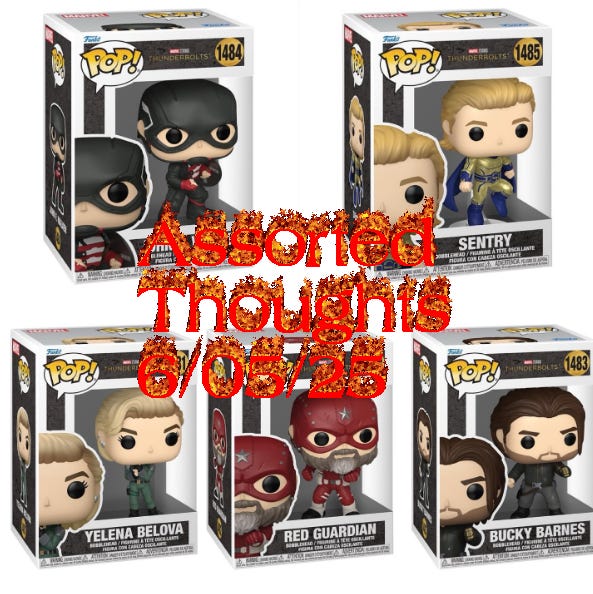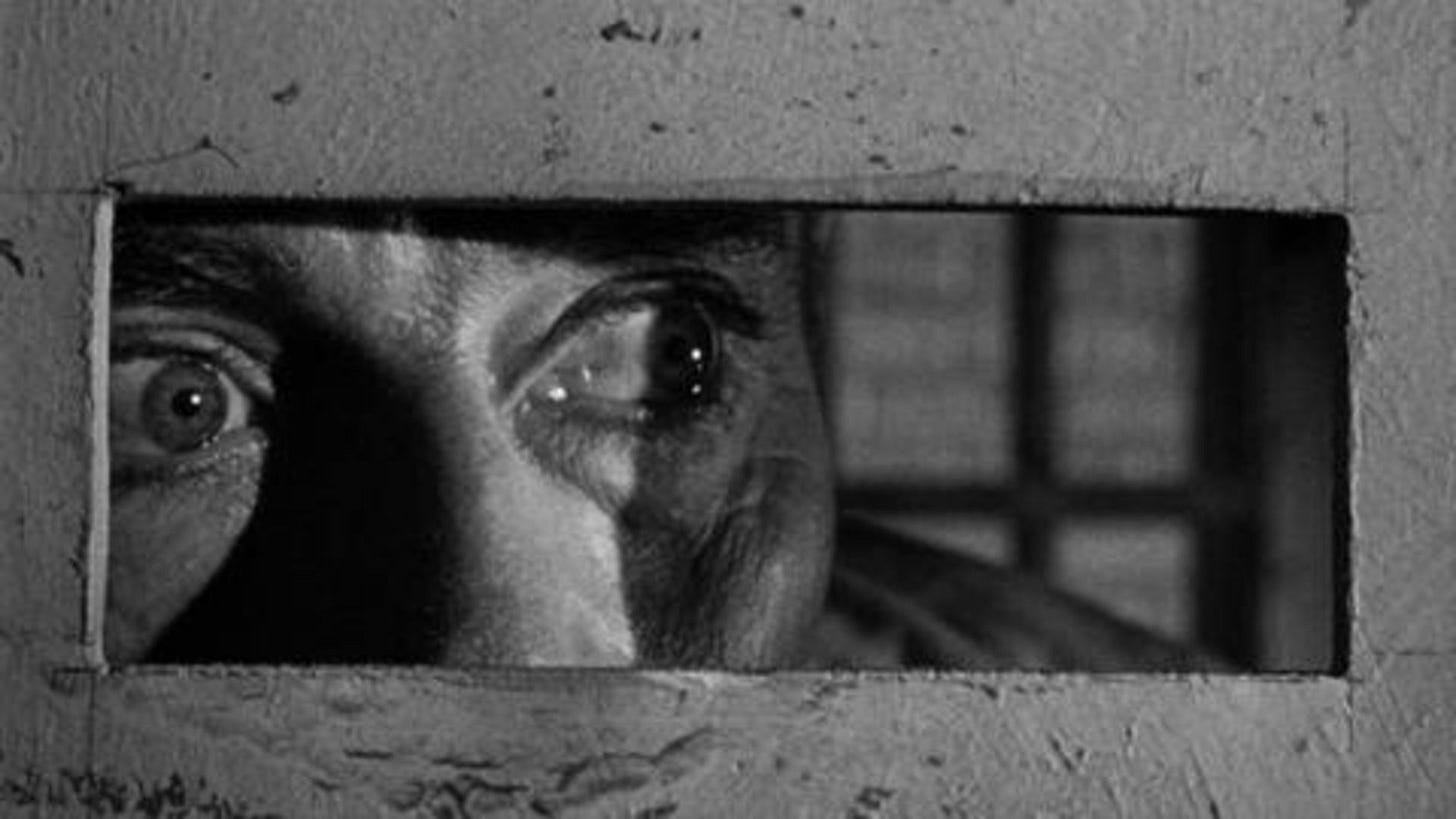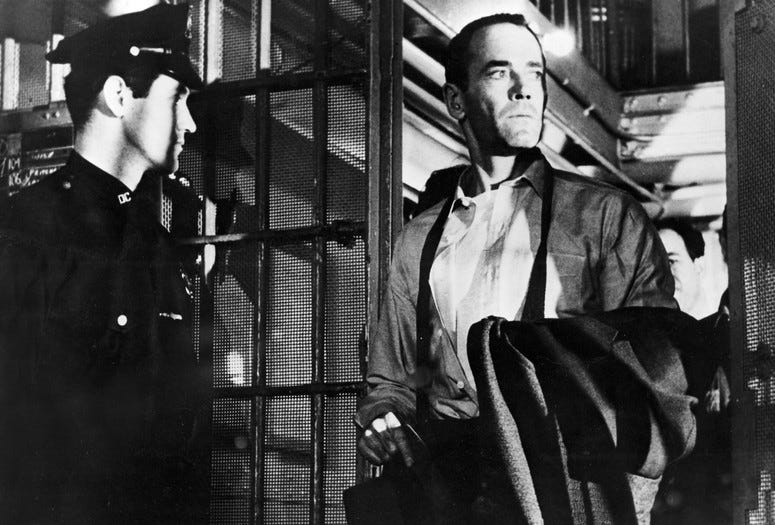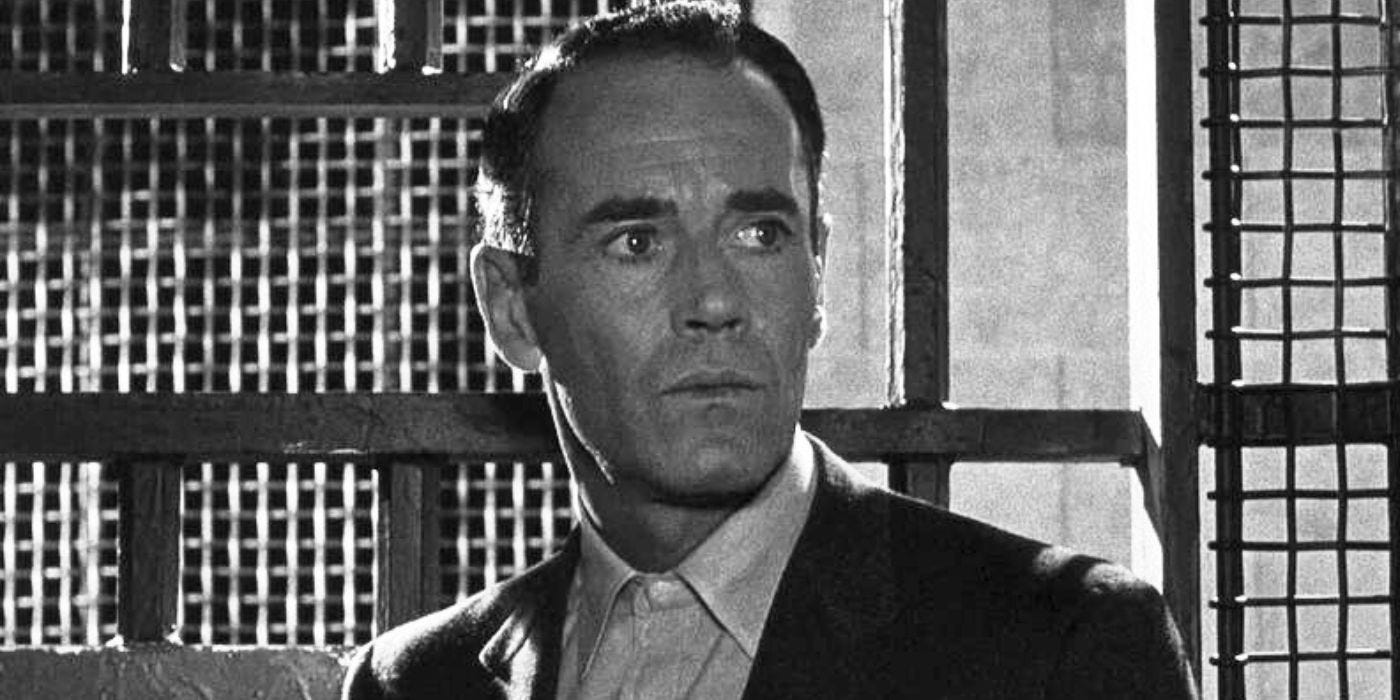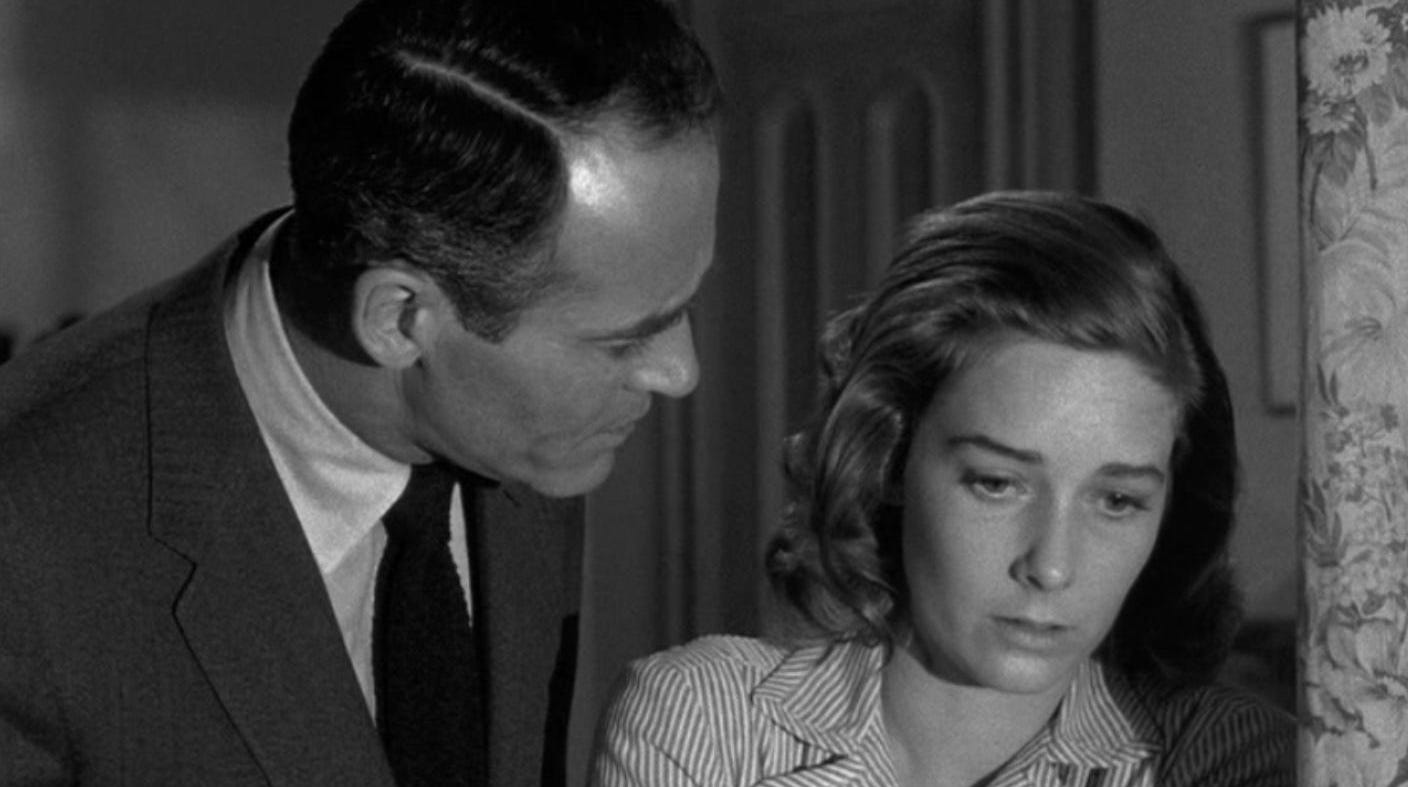Assorted Thoughts 6/05/25
A very short Assorted Thoughts this week, but I’m working on a few larger pieces and I have a very large bout of writer’s block so things are moving at a slower pace. This time next week I’ll have a piece out about Sinners, I’m holding myself to that. Okay that’s all I’ve got to say, enjoy!
On A Marvel Movie
I watched the new Marvel Movie this week, it's called THUNDERBOLTS*. It's asterisk denotes a potentially new name for this group of misfits, and yes it is exactly what you think it is (At the time of writing this, Marvel has already rebranded THUNDERBOLTS* to The New Avengers, so, there's the surprise I guess?). Of course, the THUNDERBOLTS* are secretly the Suicide Squad. And not in the sense that this is an exciting cast of misfits that comic book fans supposedly love and adore (You can't walk ten feet near a comic book store without someone telling you about how much they love Captain Boomerang.) Instead this movie is about a squad of super anti-heroes with depression. More importantly, it's a film that spends a lot of money on talented actress Florence Pugh and talented actor Sebastian Stan while simultaneously scouting talents like Lewis Pullman and Geraldine Viswanathan. There's a few other actors present, like Julia "Elaine Benes" Louis-Dreyfus and David "Stranger Things Guy" Harbour, but they are not worth raving about so I'll skip them.
When I left the film I had a realisation, not one of "Oh I'm too old for this!" or "Oh I'm just seeing it because my friends are seeing it!" which are pretty surface level analyses for any given film critic let alone myself, but instead that I really have nothing interesting to say about these. There was a moment where a friend had asked to not sit next to me because I outwardly disliked Deadpool and Wolverine which slightly upset me, but about fifteen minutes in I thought "Maybe this is for the best." What could I possibly say about THUNDERBOLTS* that a thousand other people exactly like me couldn't already say? Is the potential of this being any different from any other films enticing? Do I care whether or not Marvel is back? Am I mostly just upset because I wish Florence Pugh and Lewis Pullman would work with more talented directors? That last part is mostly the truth.
I took some joy in Pullman's performance, frantically recalling his father's ground-breaking performance in Lost Highway before deciding it was mostly unfair to compare the two. I took a great deal of joy in Sebastian Stan phoning in a performance he could care less about. I took interest in realising Stan actually is built for drama rather than action - I couldn't buy any description of Sebastian "Bucky Barnes" Stan flying in on a motorcycle to save the THUNDERBOLTS* for the life of me. I thought about Florence Pugh's comments on THUNDERBOLTS* being Marvel's first "indie film" and wondered "Is talking about depression the signifier of indie?" Which then made me think "Is an Indie Film about Depression the signifier of Arthouse?" Which then made me think about Nathan Silver's Between The Temples and it calmed me for a moment. Marvel really love to throw you some referential product placement huh? I mean David "Stranger Things Guy" Harbour talks about DoorDash and YouTube and Florence Pugh's comment of calling an Uber was the closest I got to actually groaning. It feels as though at times the writers are absolutely not in touch with anything a normal person has ever said; at one point Julia "Elise Benes" Louis-Dreyfus says of Florence Pugh that she "Looks like shit" and the whole time I'm sitting there going "This is the most beautiful woman I've seen in my life." Do they do test screenings for these films with regular people or do they just ask Disneyland parkgoers if they want to help save the MCU or whatever?
Unlike something like Shang-Chi or Deadpool and Wolverine or Guardians of the Galaxy Volume 3, this is a film that decides it wants to say something. A brave choice, I'll say, for a company who would rather spend over $80 million on Robert Downey Jr. instead of any good writers or directors. Look at any list of MCU films and check out the directors; who are these people? I guess Shane Black made The Nice Guys which is a fine enough film, Sam Raimi made a lot of cool stuff a very long time ago! Hey they even got Oscar Winning Director Chloe Zhao to make a film, hell people like Ryan Coogler right now so I guess he's there! Then you have some absolutely horrendous names following them; The Russo Brothers, Joss Whedon, Taika Watiti and Shawn Levy all hanging out. You could conduct a whole auteur's study over the entire Ant-Man franchise because they just kept bringing back Peyton Reed to direct those things. I guess people like James Gunn? I think he's terrible, to be honest, but at least he can fake being an artist unlike some of these guys. This is a film about depression, a representation of Kevin Feige's emotions because he's too fucking stupid to replicate the success he had like six years ago with Avengers Endgame. It's a film in which Florence Pugh tells Lewis Pullman that we all go through dark times and it sucks. It's a film where Lewis Pullman dies and then becomes a representation of depression itself called "The Void" and says things like "Don't you wish you could stop fighting :)" and sends them to the Depression Zone. His powers encompass all of New York and make it look like Spider-Man for PS4 when you haven't used any of the towers to show more of the map yet. Jesus christ man.
The thing is it's so obviously poorly written. They talk about depression like you do to a fifteen year old who doesn't have depression. You have a central character who turns into a literal representation of depression and our only knowledge of his backstory is that he 1. Had Abusive Parents 2. Did Meth One Time (which is, as always, a gag) and 3. Signed Up To A Superhero Testing Program In The Hopes To Stop Being Depressed. This isn't a "surprisingly well handled story about depression," this is a story with boardroom approved, thoroughly tested caricature's of depression that won't upset anyone. Of *course* Lewis Pullman's character has abusive parents, it's probably the most easily digestible form of "Thing That Would Make Someone Depressed" that refuses to have anything to say about itself besides "We should be there for people who have depression" which like, come on man. Of course, this film is going to help someone, someone's going to attach themselves to Bob or Yelena and work their way through depression which they will attribute to this film, but for the grand majority of people there's nothing new being heard here. It's algorithmically digestible depression; YouTube clips to comment "This found me at the perfect time :)" under, a film to be played by underpaid school teachers on RUOK Day, a film to be labelled as "important" by a guy in a Spider-Man shirt.
I guess the response I'll get from all this is "What do you expect?" What could I expect from Disney or Marvel or Kevin Feige or the rotting corpse of Walt Disney when it comes to something like this? This is a film conglomerate focused on shipping more Funko Pops than you can possibly imagine. This is a film company making a cinematic universe that they themselves joke about the absurdity of before reverting back to self-referential schmaltz that will make you want to throw up. This is a company that makes a movie by the director of fucking Paper Towns where the depressed main character goes "Guess I'll call an Uber™!" I guess what I do expect is for them to stay in their own lane. If the only way they can try and replicate their own success is by giving us nothing characters who mean nothing and placing the label of Mental Health onto them without even divulging on what it means for any of these characters to feel the way they do then maybe they should do something else. It's sort of embarrassing! Marvel is the very bastion of this kind of ugly blockbuster filmmaking so it doesn't surprise me, but at a certain point they have to learn their limits.
Oh and the whole film looks like shit too but I guess that doesn't matter much. Does anyone remember Hanna John-Kamen's character in this film? It's like if they made a Hawkeye who no one could remember. Sort of an interesting decision! Superhero teams seem to be the de-facto method for making one of these nowadays. No one has the patience to wait five years for these superheroes to work there way towards a resolution inducing team up movie, instead they must all work as a hivemind completing the same task rather than doing anything fun for themselves. Guardians of the Galaxy popularised this, and you can tell when a superhero squad is echoing GotG when they have a Drax, the superhero no one cares about. I guess in this case Hanna John-Kamen's character is the Drax, and Bob is meant to be Groot and Wyatt Russell is meant to be Rocket Raccoon. How gauche! I guess these characters work by being nobodies, allowing yourself to project yourself onto them because they themselves have nothing to say (Wyatt Russell's character's vision of a deadbeat dad is so funny to be honest, can't look at my baby who's doing nothing because I have to scroll my iPhone and look at articles about how I murdered a guy.) These characters won't work in the grand scheme of things, and they are destined for the grand scheme of things, because every Marvel character is. How depressing.
I guess I'll conclude this by saying; I don't know if I'll ever watch another one of these films ever again. I probably will! I hope they don't try this shit again though. There is a desire to include myself in whatever the cultural zeitgeist is, but I guess I find myself more accommodated in more artsy circles who all have not seen THUNDERBOLTS* and probably never will. That being said, I don't think I'll ever turn down free tickets to a cinema so who gives a fuck. These things don't deserve to attempt to try talking about things like depression until they get some talented writers and directors. They really don't deserve talents like Florence Pugh or Sebastian Stan, but hey at least Stan's got enough money to sustain himself if he wants to pursue more stuff like A Different Man and The Apprentice. What more do I have to say? Ughhhh David Harbour sucks? I've exhausted my options I think.
On Hitchcock's The Wrong Man
Okay so I'm writing this one after having written about THUNDERBOLTS*. I realised recently I talk very often about films I don't like, and it's not because of a lack of ability, but instead to do with a lack of confidence. I love a lot of films, but the idea of writing about them at length makes me woozy. Assorted Thoughts is not really the place for that sort of long form writing, but it's a good building block.
Anyway before I went and saw THUNDERBOLTS* on Friday night, I put on Alfred Hitchcock's The Wrong Man, a film that for the most part had been sitting in my "watch later" pile for a long time. Hitchcock is a director I've been waiting to "Wow" me for a while; this isn't to say I'm not enjoying his films, Vertigo is absolutely in my personal canon and I've loved Spellbound, Rope, Rear Window and Strangers on a Train all in great measure, all of them inspiring what is possible with film within me. There wasn't a film however that just blew my expectations out of the water, that was a consistent "how the hell did he do this?!" all the way throughout. This is to say, I loved Hitchcock, but I didn't put him on the same pedestal I had for guys like Francis Ford-Coppola, Yasujiro Ozu, Michael Mann, Kiyoshi Kurosawa, Edward Yang or Mike Leigh.
The Wrong Man, if you can't infer well enough, has boldly changed that. The Wrong Man is not only my favourite Hitchcock, it's one of the best things I've ever seen. It's a film that has so much going on behind ever corner. It serves as a rich critique of the American justice system, showing terrible cops and judges and lawyers and everything in between. It takes on the very concept of debt, it discusses family dynamics, it talks about catholic guilt, self doubt, mental health, marriage and so much more in one single swoop. It doesn't pull it's punches but it never trips over it's own feet. It's a film where the camera is it's own beast, stylistically tuned for it's own striving for perfection in a way that Hitchcock matched in Vertigo but not to this very level. When Fonda is in his cell and we watch the camera hypnotically swing around his face it's there and then that Hitchcock reminds us that he is watching.
The Wrong Man is so interesting from the get go. From the title alone you know that Henry Fonda's Manny is a victim of mis-identification. The titles of a Hitchcock film are always very descriptive of what we're in for; Rope is a film about a murder that is solved because of a rope, Vertigo is a film about a man with vertigo, Rear Window is about a man looking outside his Rear Window, but The Wrong Man's title is so blatant and obvious. Henry Fonda is The Wrong Man for this crime. As the film opens we witness Hitchcock's shadow and his voice bellowing out as he let's us know that this a true story. The suspense that we perceive is almost lost, instead of a suspense to whether or not Fonda is the man who committed the crime, there is a suspense to whether he can get out of it. This very idea of it being a true story as well as so blatant actually works in it's favour, on multiple occasions we have to sit there and ask ourselves the question of "How could this possibly happen?" How could multiple people witness Fonda as the man who robbed them? How could two of the witnesses to Fonda's not being at the crime scene both be dead? How could any of this possibly happen to a real person? At a certain point, one might wonder if even Fonda is asking himself if he did these crimes or not.
One of the words I kept grabbing at during the course of the film was "emotional." Suspense is a very powerful thing that Hitchcock plays on a lot of the time, but the emotions that we feel in a Hitchcock film can all be very similar; anticipation, fear, worry. Vertigo was the first film of his that I really took away a conglomerate of conflicting and interesting emotions from, but The Wrong Man feels like a catalyst for it. The Wrong Man allows itself to go in strange directions, encounter strange characters, witness strange events. When we watch Henry Fonda wordlessly walk into a store following the instructions of a police officer, only for the officer to say something we can't hear to the cashier once Fonda has completed this charade there are a thousand feelings to try and grab; a fear, a confusion, a sadness at the fact that an innocent man has to go through this, there's a humour to it too. The best films in my mind are the ones that can conjure these flurry of emotions on a consistent basis and keep the flurries surprising and interesting. By having this approach of telling us the answer up front, we're left searching these images for any semblance of Why? Why is Henry Fonda's character going through this? How is it affecting his family? How does this affect him? How does he get out of this? The questions themselves might be basic, but the ferocity at which they approach is anything but.
The way Hitchcock achieves this vision is by really making use of his talents as a formalist. Every location, every frame, every actor, every cut and every line brings us to a question of why or how. The prison in which Fonda briefly spends time in, the country in which Fonda and Miles search for any proof of innocence, the courthouse in which Fonda is being processed, the bridge overlooking the apartment of a man who's already dead - these images are bursting with emotional resonance and intrigue. At some point this whole thing becomes entirely overwhelming not only for us, but it's characters. As the film enters it's final act we witness Fonda's wife, Vera Miles, fall into a state of psychosis as the weight of these events falls on her. Not only has this made her depressed, it's made her delusional, as though she is the worst person in the world and everything is her fault. As a doctor puts it, it's as if the truth is totally eclipsed. Miles is the star of these final thirty or so minutes, and as her face gradually falls so too does the mood, so too does any semblance of hope. The family will fall into a chaotic debt, Fonda might not even get off, their sons have to deal with this, the family has to deal with this; a lifetime of guilt and shame for something that didn't even happen to them.
The film packs two incredibly powerful punches in it's finale. We witness the man who has actually committed the crimes commit a fresh crime, he fades into the frame and takes the place of Fonda's face; you can imagine getting them confused from afar. He fails this crime, this time being caught and sent to be locked up while Fonda is called in by the police for a reason he doesn't know. He's told they found the real criminal, the criminal looks him in the eyes; I guess they look similar. Interestingly when the criminal is caught he yells "This is my first time doing this, I haven't hurt anyone!" If we're to believe the story, yes this is the correct man, but for a moment let's think what if it isn't? What if this is another man with a case of mistaken identity? What if this is a man who is about to go through exactly what Henry Fonda's character has went through? Did we not just go on this very emotional rollercoaster with him? Fonda goes to the mental institute he's put his wife in to tell her the news. She's still distraught, unable to see clearly. This supposed great news means nothing to her, she tells Fonda "That's fine for you." She's solemn, quiet, she's smaller than she's ever looked. There is a grief in this scene that is hard to put into words, it's an outstanding piece of both acting and directing.
As the film ends we cut from Vera Miles looking solemn to a screen that tells us that she got better and two years later she was all okay! The family walks together in a bright and beautiful city, it's all such a strange switch up from the film we had just been watching. I think in a sense it works perfectly, really it's quite terrifying. Two years later this is a family that has to deal with what had happened on a traumatic basis, the beauty of there still being together is great but there return to normalcy serves as a reminder of the emotional battle they've undertaken. Does it work perfectly? No, and on a basic level it's a strange decision for a film that is so harsh, but it's not a total failure.
The Wrong Man is undoubtedly my favourite Hitchcock, it's a film who's emotions still exist within me now, it's one that has an example of every great thing Hitchcock has ever done while still being as a whole, it's own thing that stands out in a satisfying way. I'm honestly shocked this isn't a more common pick for best Hitchcock, but a small club is always a fun one. I'd love to talk about this more at length one day, maybe when I've watched more Hitchcock's.


